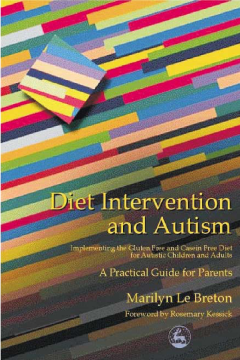
Additional Information
Book Details
Abstract
People with autism often are intolerant of gluten (a protein in four types of cereal) and casein (a protein found in animal milk). There are many testaments to the benefits for such people of a diet that excludes gluten, casein, monosodium glutamate and aspartame, and these persuaded Marilyn Le Breton to put her autistic son Jack on the diet.
This is the book that Marilyn wishes had been available to her when she first did so. In it she explains what the diet is all about and how it works, what foods can form part of the diet and what should be excluded. She addresses frequently asked questions and misconceptions, such as 'Is the diet too difficult and time-consuming? How strictly do I need to adhere to it? Is the diet expensive to implement?' and gives practical advice on basic equipment and ingredients, what to expect when your child starts the diet, how to adapt family meals and how to minimise cross-contamination in the kitchen. The book includes a wide selection of recipes, an extensive list of addresses and websites of suppliers of foodstuffs in the UK, and suggestions for finding out more information. It is the first book of its kind to be written specifically for those living in the UK.
Marilyn's own experience and sensible approach ensure that this book will be invaluable for any parent of a child with autism, or any adult considering embarking on the diet.
The Sceptical Author tried the diet with her son, Jack. It turned out to be a success, both for Jack and the people surrounding him.. Le Breton wrote this book the way she wanted to after having achieved what she thought was impossible with the help of this diet. Diet Intervention and Autism is very well-written and user-friendly, it manages to answer many of the frequently asked questions and clears away any other possible confusing situations. Le Breton's own experience and her sensitive approach make this book an indispensable guide for someone wanting to try this diet.
De Stem van de Ouders (Translated from Dutch)
I am writing this book review as a parent whose daughter h on a gluten-free diet for two years and on a casein-free diet for one year. I still, however, found it a very inspiring and informative book. I found the explanations in the book very clear and easy to understand. I tried a selection of the recipes, all of which I found tasty and easy to prepare, especially the casseroles and soups. In summary, this is an excellent book: if you are wondering whether to start a diet, buy this book and the decision will be made for you.
Afasic News
`We admit to prejudice when we say that Special Diets For Special Kids is the best starting point for the GF/CF diet, but if you happen to live in the U.K., you will not want to miss Marilyn Le Breton's new book, Diet Intervention and Autism (Jessica Kingsley). The book covers much of the same ground as Special Diets, and in organised in much the same way (it even includes similar FAQ.) The main reason European readers will love this book, however, is that they will not have to contend with American ingredients that are often unfamiliar and unavailable to them. The book contains less science than Special Diets, which may appeal to biology-phobic parents. It has a very good reference and resource section.'
The Andi News
Marilyn Le Breton is the mother of two sons, one of whom is autistic and has benefited considerably from a gluten and casein free diet.
It is easy to read with excellent practical advice and encouragement for desperate parents/carers. The diet described in this book (many recipes are given together with a list of what to look out for when shopping) was evidently very successful in changing the life of the author's son and may work well for others faced with similar problems. The book also puts the parent/carer in charge of the treatment by creating exciting dishes that are not unlike the familiar ones of mother's cooking except that they are 'non-toxic' or 'non-additive'. For EP it will be useful to know about this well-written book.
The British Psychological Society
This book is based on Marilyn Le Breton's personal experiences when implementing a special diet with her youngest son, who has autism.The reader is guided through the misconception and frequently asked questions about die, and is advised on how to introduce the diet to a child.
British Journal of Occupational Therapy.
This is a book I would strongly recommend to parents and carers of children with autism. It should help take the mystery out of diets and give parents the confidence to start a dietary regime for their child.
The British Journal of Developmental Disabilities
